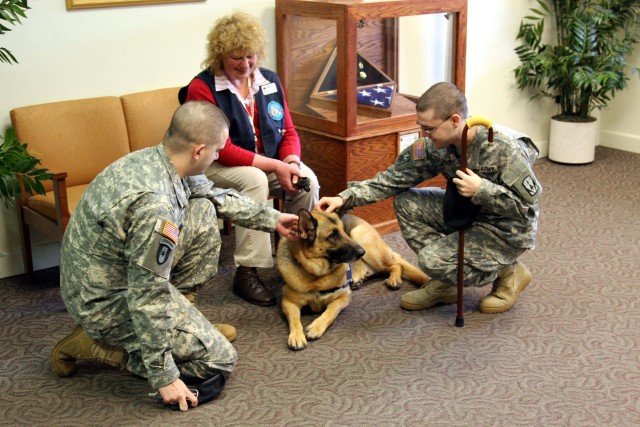FORT LEWIS, Wash. - Fritz lowers blood pressure. He reduces anxiety. He encourages relaxation. He's an altogether different type of medicine.
As a certified pet therapy dog, the 6-year-old German shepherd visits the Warrior Transition Battalion on a regular basis with his handler, Amanda Hackbarth, to interact with the Wounded Warriors in their barracks here.
"Fritz gives them a chance to vent out their problems," said Hackbarth, a Red Cross volunteer.
The canine started visiting Warriors last spring, and since then has met with everyone from the secretary of the Army to Madigan inpatients to warriors. He soothes Soldiers who need a respite from stress, dealing with crowds, or just a few moments to enjoy playing with a dog.
For Cpl. Tyler Nash, a medic who spent nine months working in a Baghdad emergency room, visiting with Fritz calms him.
"Dogs always sense what type of mood you're in, and always cheer me up," said Nash.
The corporal was injured during a rocket attack and has severe post-traumatic stress disorder; he lost 100 patients during his time in the ER, including five young children right before he left the country.
"I'm not good with groups because of my PTSD and everything, and it's really relaxing," said Nash, who is working on two bachelor of arts degrees while in the WTB.
Pet therapy serves as one of many eclectic social work programs that also include Tai Chi and Zen meditation, which benefit the mental well-being of warriors.
"Animals are comforting, non-threatening, stress-reducing, and they give unconditional, positive regard to anyone who's been through combat, trauma or medical stress," said Ellen Bloom, chief of mental health for the WTB.
Studies since the 1980s support the physiological and mental benefits of pet therapy. A 1992 Australian study found that pet owners had lower blood pressure and triglyceride levels than did non-pet owners.
In addition, studies have shown that being around animals has a calming effect on people, and that this interaction can provide stress-reducing social support.
This support is a key reason Fritz and his handler come to the WTB.
For Sgt. Shanon Chalfant, visiting with Fritz helps him relax as he works through the changes in his life while transitioning out of the Army.
"It definitely helps calm me down, get my mind off of everything going on in my life," said Chalfant. "It's like a sense of relief."
Suzanne Ovel is the public affairs officer for Fort Lewis' Warrior Transition Battalion. This article appeared in Fort Lewis' Northwest Guardian.


Social Sharing